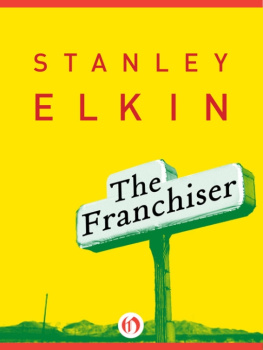Stanley Elkin
Mrs. Ted Bliss
To Joan and her brother, Marshall
Sometimes, two, three times a year, there would be card parties, or at least invitations to them. Notices by the security desk in the lobby, or left by the door at each condominium, or posted in the game or laundry rooms, or maybe nothing more than a poster up on the easel near the lifeguards station on each of the half-dozen rooftop swimming pools in the condominium complex, announced that scheduled at such-and-so a time on so-and-such a Saturday night there was to be a gala, come one come all, sponsored by the residents of this or that buildingGood Neighbor Policy Night, International Evening, Hands Across the Panama Canal. Usually there would be a buffet supper, followed by coffee, followed by entertainment, followed by cards.
It wasnt that Bingo didnt have its partisans. Wasnt Bingo, like music, an international language? But thats just the point, isnt it, Dr. Wolitzer, chairman of the Towers Entertainment Committee, argued: The idea of these evenings was to get to know one another, and there was no nutritional value in the conversation of Bingo. G forty-seven, O eleven, I twenty-four. What kind of exchange was that? It was empty of content.
Cards is better? Irv Brodky from Building Number Four might counter. I see your quarter and raise you a dime? This is hardly the meaning of life either.
It could be a bluff, the doctor responded. A bold bluff answered by a bluff more timid. Theres character here. Theres room to maneuver.
Wolitzer had been a professional man, had two or three years to go before hed have to step down as chairman of one of the complexs most influential committees. Brodky was nobodys fool; it would come as no surprise to him that if it came to a vote cards would win out over Bingo. Wolitzer was the glibber of the two and, though it hadnt passed Brodkys notice that the old doc might not himself be bluffing, Irv B. wasnt going to the wall on this one and didnt press the issue. Indeed, he backed down with considerable grace, taking it upon himself to suggest that the Entertainment Committee adopt a cards resolution by acclamation. Also, unless you were actually in it for the tsatske prizes travel alarms, artificial plants, shadow boxes practically everyone appreciated a good game of cards.
They did not, could not, know that the bloc of Colombian and Chilean and Venezuelan condominium owners along with the tiny contingent of Cubans couldnt have cared less for these evenings. They had enough friends already, muchas gracias very much, good northern neighbors to last a lifetime and, if truth be told, commanded a sufficiency of English to lord it over this group of retired and fixed-income refugees drifted south from places frequently even farther from Miami Beach Cleveland, Chicago, New York, St. Louis, Detroit than the homelands of the South American newcomers.
Actually, these ex-Chicagoans and Clevelanders, former New Yorkers, Detroiters, and erstwhile St. Louisans, were, for all the variety of their geographic, financial, political, and even educational backgrounds, pretty much cut from the same cloth. They were Americans. Really, in existential ways they might not even understand, except for the fine, almost nit-picking distinctions between the Democrat, Socialist, and Republican parties, they had no political backgrounds. They were Americans. If not always at ease, then almost always easy to get along with. They were reasonably affable, eager as Building Fours Irving Brodky to meet you halfway. They knew in their gut that life was short, and put up with it graciously.
They were Americans, cocks-of-the-walk, stereotypical down to the ground, and would have expressed astonishment to know that the very people to whom, no questions asked, they would have extended their hands in friendship during all those galas on all those international evenings, generally dismissed them as just so many babes in the wood. And who, though the South Americans lived among them and to whom they sometimes, if, say, a death in the family forced the surviving party, by dint of the sheer weight of loneliness, to list a condo in the Miami Herald as For Sale by Owner (this would have been during the flush times, from the late sixties through the mid-to late seventies, when the building boom was still on, when it was still a sellers market), would have paid fabulous fees, handsome key money, vigorish, baksheesh that the Southern Hemispherians accepted as the cost of doing business and the surviving parties looked on as the very act of business itself, something maybe even a little sacred and holy not about profit per se but almost about the idea of appreciation, contemptuous of them not so much because they were giving far above par but because these naive, bereft Americans never suspected that their good neighbors to the south already knew it, expected it, may actually have been surprised or even a little disappointed that they hadnt been asked to buy them out at still dearer, more exorbitant prices. Despising them, too, perhaps, for the failure of their imaginations, blind not only to the source of the money with which they were so free but also to the reasons they were so free with it. (Granted, they were Americans, but werent they Jews, too?) It never seemed to occur to the Americans that some complicated piece of history was happening here, that certain seeds were being planted, certain stakes claimed that certain bets were being hedged. (Didnt they ever get past the Wednesday Food Section in the newspapers, didnt they read beyond the Winn-Dixie coupons? The pot was being stirred in El Salvador. Nicaragua was starting to simmer. Not fifteen miles from where they stood the Contras were already setting up. In Peru, the Shining Path was in place. Everywhere, the hemisphere seethed along all its awful fault lines, along politics ancient tectonic plates, meaningless to them as the Spanish language.) As if safe harbor were an alien concept to them, diaspora, exodus, the notion of plans.
Theyd been around the block, Jews had, and, to hear the world tell it, had a reputation for being complicated and devious as Jesuits. Why, then, did they overlook in others what they so blithely practiced among themselves the luxury of a private agenda? Were they so very arrogant that, while completely caught up in their own shrewd plots, they declined to believe in the schemes of others? Unless of course their bark was so much worse than their bite. Unless of course they were all hype and fury and didnt deserve their notoriety as a people who bore a grudge. Even so, the Venezuelans and Chileans, Cubans and Colombians did not much trust (to say nothing of enjoy) such innocent, credulous souls. Why, there were a dozen unexplored reasons the South Americans might be interested in buying up modest, middle-class properties like those to be acquired in the Towers. As long ago as 1959, when Fidel Castro first made his revolution a couple of hundred or so miles from Miami, it should have been clear to anyone that the next wave of immigration would be from the south. These Chileans and Colombians, Cubans and Venezuelans were merely advance men, outposts, an expeditionary force. A party (in a tradition that went back five hundred years) of explorers. Testers of the waters who would one day accomplish with drugs what their proud Spanish forebears had accomplished with plunder.
They were only preparing the way.
(And another thing. It did not apparently register with the old-timers that there was, on average, probably a ten- or fifteen-year difference in their ages, advantage South America. Could they fail to project that it wasnt the survivors who sold their condos to the Latin Americans who would ultimately survive? Something was happening in Miami and Miami Beach, up and down the south coast of Florida, that went unmarked on the Jews social calendars. It was history.)

















